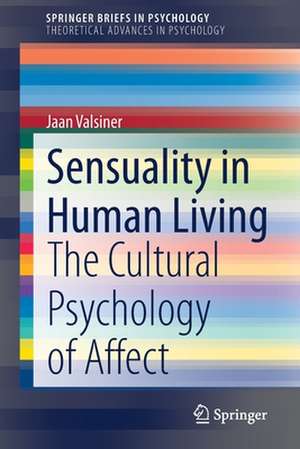Sensuality in Human Living: The Cultural Psychology of Affect: SpringerBriefs in Psychology
Autor Jaan Valsineren Limba Engleză Paperback – 23 iun 2020
- Provides a new theory of aesthetic synthesis;
- Demonstrates the links between art and science;
- Provides a new understanding of the role of affect in human cognition.
Din seria SpringerBriefs in Psychology
-
 Preț: 345.89 lei
Preț: 345.89 lei - 17%
 Preț: 359.88 lei
Preț: 359.88 lei -
 Preț: 346.86 lei
Preț: 346.86 lei - 5%
 Preț: 375.88 lei
Preț: 375.88 lei -
 Preț: 479.67 lei
Preț: 479.67 lei - 5%
 Preț: 413.07 lei
Preț: 413.07 lei -
 Preț: 380.84 lei
Preț: 380.84 lei -
 Preț: 377.35 lei
Preț: 377.35 lei -
 Preț: 408.66 lei
Preț: 408.66 lei -
 Preț: 477.56 lei
Preț: 477.56 lei -
 Preț: 344.36 lei
Preț: 344.36 lei - 5%
 Preț: 421.92 lei
Preț: 421.92 lei -
 Preț: 479.47 lei
Preț: 479.47 lei -
 Preț: 441.85 lei
Preț: 441.85 lei -
 Preț: 478.53 lei
Preț: 478.53 lei -
 Preț: 443.97 lei
Preț: 443.97 lei -
 Preț: 376.43 lei
Preț: 376.43 lei - 5%
 Preț: 356.32 lei
Preț: 356.32 lei -
 Preț: 443.75 lei
Preț: 443.75 lei -
 Preț: 411.75 lei
Preț: 411.75 lei - 15%
 Preț: 462.51 lei
Preț: 462.51 lei -
 Preț: 412.89 lei
Preț: 412.89 lei -
 Preț: 374.46 lei
Preț: 374.46 lei -
 Preț: 377.18 lei
Preț: 377.18 lei - 15%
 Preț: 463.68 lei
Preț: 463.68 lei -
 Preț: 343.88 lei
Preț: 343.88 lei -
 Preț: 474.45 lei
Preț: 474.45 lei -
 Preț: 376.22 lei
Preț: 376.22 lei - 15%
 Preț: 461.54 lei
Preț: 461.54 lei -
 Preț: 378.34 lei
Preț: 378.34 lei - 5%
 Preț: 357.23 lei
Preț: 357.23 lei -
 Preț: 342.74 lei
Preț: 342.74 lei -
 Preț: 376.80 lei
Preț: 376.80 lei -
 Preț: 376.04 lei
Preț: 376.04 lei -
 Preț: 376.22 lei
Preț: 376.22 lei -
 Preț: 344.25 lei
Preț: 344.25 lei -
 Preț: 442.44 lei
Preț: 442.44 lei -
 Preț: 375.23 lei
Preț: 375.23 lei -
 Preț: 374.85 lei
Preț: 374.85 lei -
 Preț: 347.32 lei
Preț: 347.32 lei -
 Preț: 409.80 lei
Preț: 409.80 lei -
 Preț: 374.85 lei
Preț: 374.85 lei -
 Preț: 414.42 lei
Preț: 414.42 lei -
 Preț: 344.10 lei
Preț: 344.10 lei -
 Preț: 446.65 lei
Preț: 446.65 lei -
 Preț: 476.79 lei
Preț: 476.79 lei -
 Preț: 379.68 lei
Preț: 379.68 lei -
 Preț: 380.07 lei
Preț: 380.07 lei -
 Preț: 408.44 lei
Preț: 408.44 lei -
 Preț: 376.43 lei
Preț: 376.43 lei
Preț: 410.94 lei
Nou
Puncte Express: 616
Preț estimativ în valută:
78.64€ • 85.39$ • 66.06£
78.64€ • 85.39$ • 66.06£
Carte tipărită la comandă
Livrare economică 22 aprilie-06 mai
Preluare comenzi: 021 569.72.76
Specificații
ISBN-13: 9783030417420
ISBN-10: 3030417425
Pagini: 103
Ilustrații: XII, 103 p. 46 illus., 44 illus. in color.
Dimensiuni: 155 x 235 mm
Greutate: 0.17 kg
Ediția:1st ed. 2020
Editura: Springer International Publishing
Colecția Springer
Seriile SpringerBriefs in Psychology, SpringerBriefs in Theoretical Advances in Psychology
Locul publicării:Cham, Switzerland
ISBN-10: 3030417425
Pagini: 103
Ilustrații: XII, 103 p. 46 illus., 44 illus. in color.
Dimensiuni: 155 x 235 mm
Greutate: 0.17 kg
Ediția:1st ed. 2020
Editura: Springer International Publishing
Colecția Springer
Seriile SpringerBriefs in Psychology, SpringerBriefs in Theoretical Advances in Psychology
Locul publicării:Cham, Switzerland
Cuprins
Author’s Preface.
Introduction: Going beyond the lures of sexuality
Part I. Living by affective hyper-generalization
Chapter 1. Theory of the dynamic sublime, grotesque, and aesthetic
Chapter 2. Embodiment in action: The making of the self through the body
Part 2. Feeling into the world
Chapter 3. Romantic encounters Chapter 4. Sensuality in Seeing Through
Part 3. Theoretical proliferations
Chapter 5. Sensuality In-Between: Dialogical negotiation of AS-IS with AS-IF, and with AS-IT-COULD BE
Chapter 6. Hierarchical integration of human psychological needs
General Conclusion:
Sensual living in affectivated worlds
Notă biografică
Jaan Valsiner is a cultural psychologist with a consistently developmental axiomatic base that is brought to analyses of any psychological or social phenomena. He is the founding editor (1995) of the Sage journal, Culture & Psychology. From 2013 to 2018 he was the Niels Bohr Professor of Cultural Psychology at Aalborg University, Denmark where he continues his research on cultural psychology, in combination with collaboration with University of Luxembourg and Sigmund Freud Privatuniversität Wien in Austria and in Berlin. He has published and edited more than 40 books, the most pertinent of which are The guided mind (Cambridge, Ma.: Harvard University Press, 1998), Culture in minds and societies (New Delhi: Sage, 2007), Invitation to Cultural Psychology (London: Sage, 2014) and Ornamented Lives (Charlotte, NC: Information Age Publishers, 2018). He has been awarded the Alexander von Humboldt Prize of 1995 in Germany, and the Hans-Kilian-Preis of 2017, for his interdisciplinary work on human development. Previously while working in the United States he was a recipient of a Senior Fulbright Lecturing Award in Brazil 1995-1997. He has been a visiting professor in Brazil, Japan, Australia, Estonia. Germany, Italy, Luxembourg, United Kingdom, and the Netherlands. Since 2017 he is a Foreign Member of the Estonian Academy of Sciences.
Textul de pe ultima copertă
This book is a theoretical account for general psychology of how human beings meaningfully relate with their bodies-- from the basic physiological processes upwards to the highest psychological functions of religiosity, ethical reasoning, and devotional practices. It unites art and science into a new theory of affective synthesis that human minds are constantly involved in their everyday life worlds.
- Provides a new theory of aesthetic synthesis;
- Demonstrates the links between art and science;
- Provides a new understanding of the role of affect in human cognition.
Caracteristici
Provides a new theory of aesthetic synthesis
Demonstrates the links between art and science
Provides a new understanding of the role of affect in human cognition
Demonstrates the links between art and science
Provides a new understanding of the role of affect in human cognition
